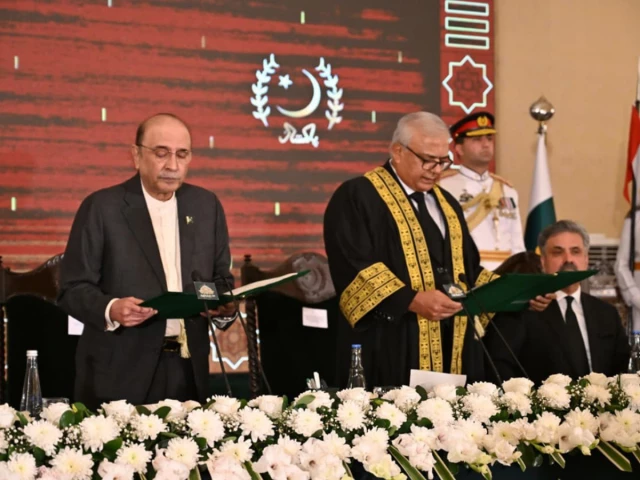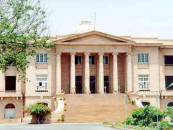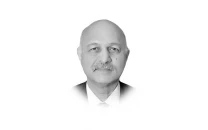Legal ambiguity: FCC chief justice’s powers remain unregulated
Parliament yet to provide a right of appeal against constitutional court’s decisions

Contrary to its earlier position, the PML-N led federal government has yet to carry out any legislation to regulate the discretionary power of the chief justice of the newly established Federal Constitutional Court (FCC) to form benches.
Likewise, so far, no right of appeal has been provided against FCC decisions.
A former attorney general (AGP) has pointed out that only the intra-court appeals (ICAs) pending before the Supreme Court may be heard, but in the future, no ICA can be filed against an FCC decision. He referred to Article 175(E)(4) of the Constitution, which states that only pending appeals would be heard, but provides no mechanism for future ICAs.
Even Ibaad-ur-Rehman Lodhi, Advocate on Monday raised an objection before the FCC that the court could not hear ICAs pending in the Supreme Court.
He stated that those ICAs were filed against judgments given under Article 184(3) of the Constitution. However, this article was omitted through the 27th Constitutional Amendment.
The former AGP stated that it is bad drafting. However, he disagreed with Lodhi and said that all pending appeals in the SC will be transferred to the FCC for adjudication.
The newly inserted Article 175(E)(4) states that all petitions which fall under this article, and appeals or review applications against judgments rendered or orders passed under this article, pending or filed before the SC or its constitutional benches prior to the 27th Constitutional Amendment “forthwith stand transferred to the FCC and shall only be heard and decided by the FCC.”
The phrase “this article” has been used twice in this provision.
Regarding the question about the non-existence of a right of appeal against FCC decisions, a government official admitted that there is no such right unless the FCC itself provides for it in the rules or unless it is introduced through some “FCC Practice & Procedure Act”.
There is no clarity on whether the government will carry out legislation to provide a right of appeal against FCC decisions.
During former chief justice of Pakistan (CJP) Umar Ata Bandial’s tenure, ruling political parties—especially the PML-N—had raised concerns over the discretionary power of the CJP to form benches.
To bring transparency, the PDM-led government introduced the Supreme Court Practice and Procedure Act 2023, under which a committee comprising three senior judges was empowered to form benches.
The right of appeal against Supreme Court decisions in public-interest matters was also provided. The Supreme Court, by majority, had endorsed the Supreme Court Practice and Procedure Act 2023.
Even the current chief justice of the FCC, Justice Amin-ud-Din Khan, was among the judges who had endorsed the act. However, he, as master of the roster, is now forming benches in the FCC.
An FCC full-court meeting was held on November 17, wherein it was unanimously resolved that the Supreme Court Rules, 2025, are adopted for the practice and procedure of the court, mutatis mutandis, excluding Orders XI, XIII and XXXVII, until the framing of the Court’s own Rules.
“Every cause, appeal, petition or matter shall be heard and disposed of by a bench consisting of not less than two hon’ble judges, to be nominated by the hon’ble chief justice.
“Appeals arising out of judgments passed by a division bench shall be heard by a bench comprising not less than three hon’ble judges of this court, to be nominated by the hon’ble chief justice,” said a notification issued after the FCC meeting.
Some senior lawyers are also wondering why there is no proper representation of each province on all FCC benches. Currently, two- and three-member benches are hearing cases. In some instances, judges belonging to the same province are sitting together on a bench.
It is learnt that more than 20,000 cases are likely to be transferred from the Supreme Court to the FCC. The FCC chief justice has also approved the creation of more than 200 vacancies for court officials.
IHC is likely to be shifted
It is also learnt that the Islamabad High Court (IHC) is likely to shift to its old premises located in Sector G-10 of the capital as the FCC is now housed in its building. A majority of lawyers are supporting the shifting of the IHC to the old building because the Islamabad District Courts are located nearby. A senior government official has confirmed that the government has decided to shift the IHC in January.
However, the current body of the Islamabad High Court Bar Association is requesting that the shift be postponed until February, the month of the IHCBA election.
The official stated that the FCC will operate from the new building of the IHC. All eyes are on FCC judges regarding the kind of jurisprudence they will evolve. There is no reported judgment on the FCC website so far.


















COMMENTS
Comments are moderated and generally will be posted if they are on-topic and not abusive.
For more information, please see our Comments FAQ